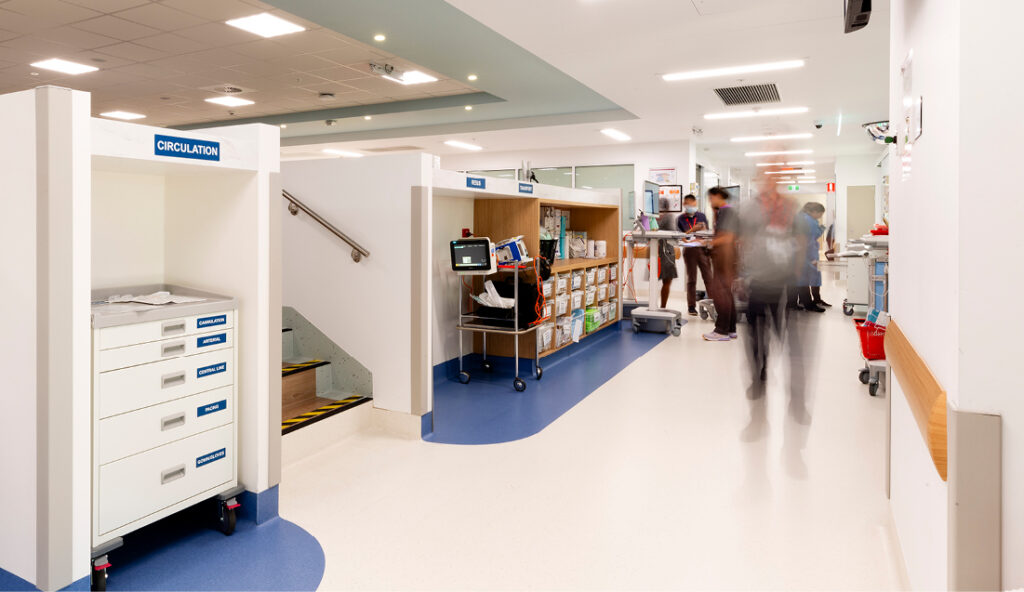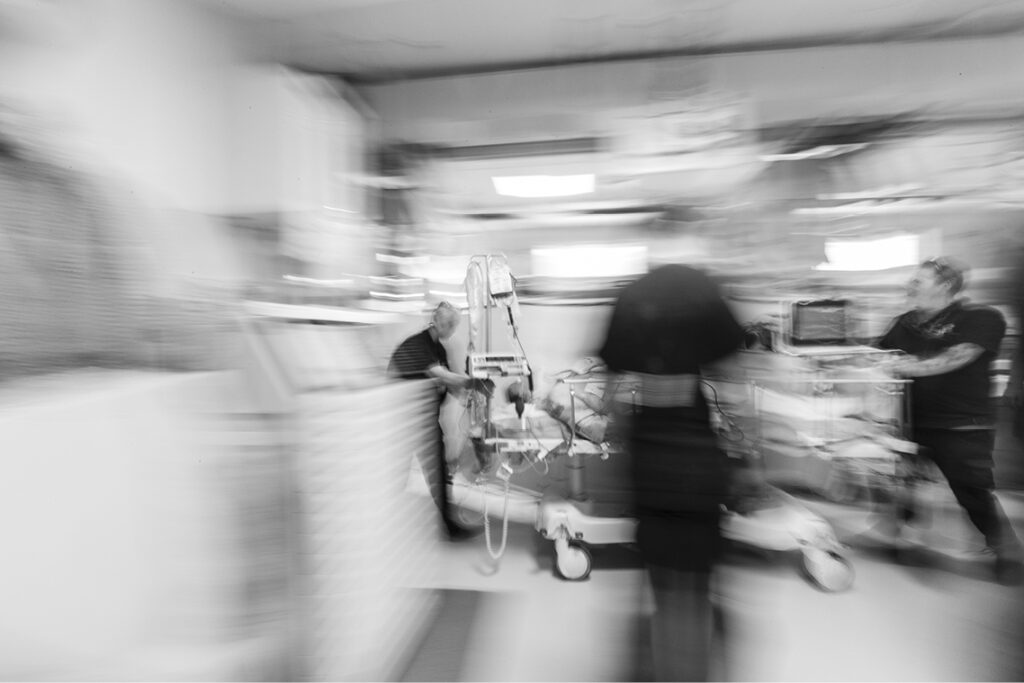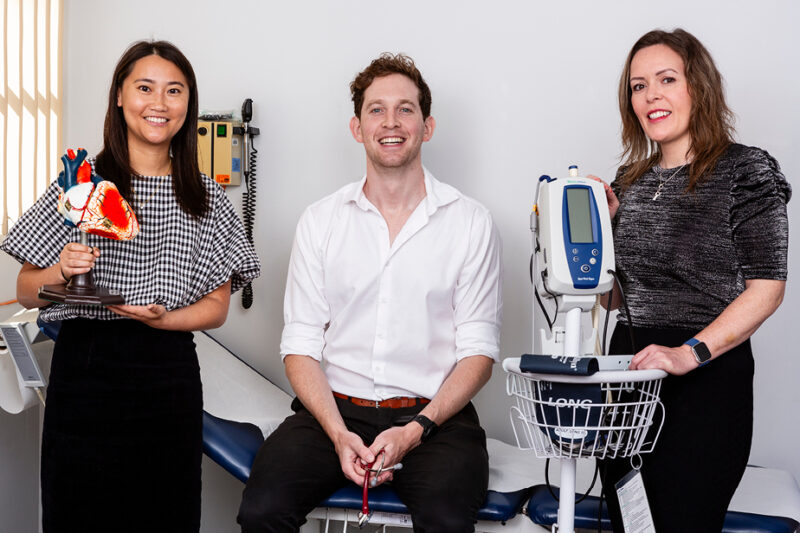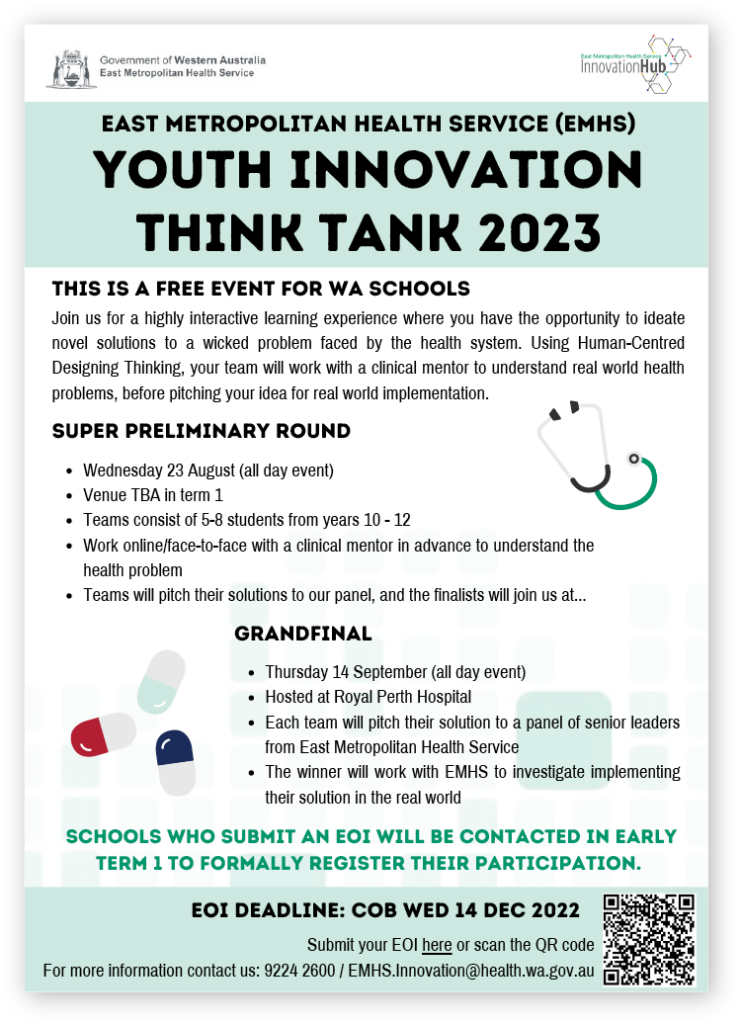A better tomorrow
EMHS research and innovation
2023-24 research snapshot

101
New research projects
| 2022-23 | 93 |
| 2021-22 | 120 |
| 2020-21 | 100 |

39
Investigator-initiated projects conducted by local staff and sites within WA Health
| 2022-23 | 27 |
| 2021-22 | 37 |
| 2020-21 | 37 |

22
Projects conducted in collaboration with not-for-profit organisations and institutions
| 2022-23 | 23 |
| 2021-22 | 19 |
| 2020-21 | 12 |

24
Clinical trials commenced
| 2022-23 | 32 |
| 2021-22 | 47 |
| 2020-21 | 36 |

16
Projects conducted in collaboration with WA universities
| 2022-23 | 11 |
| 2021-22 | 17 |
| 2020-21 | 15 |
Refreshed research strategy driving a new focus on unique strengths and addressing inequality in health access
In December 2023 EMHS launched its new Research Strategy and Implementation Plan 2024-28 to guide research over the next 5 years. At the heart of this strategy is the identification of 3 research focus areas:
- Community and virtual care
Since its inception, EMHS has recognised the need to leverage rapidly advancing technology in the service of healthcare, and has invested heavily in developing our Health in a Virtual Environment (HIVE) service. Research is critical to developing safe and effective digitally enabled healthcare. - Improving mental health
As one of WA’s largest providers of mental health services, EMHS recognises there is a lack of mental health research capacity across our state, at a time when demand for mental health care is increasing. - In line with the state government’s new WA Health and Medical Research Strategy 2023-2033, EMHS has also considered how our unique services and capabilities can best contribute to a vibrant WA health and medical research sector. As home to the State Major Trauma Unit, and with outstanding emergency, intensive care and radiology research teams, EMHS has made improving outcomes from major trauma its third research focus area.
Our Research Strategy also reflects EMHS’ commitment to ensuring equitable access to healthcare by defining priority groups and ensuring access to research and clinical trials specific to these groups’ needs. Research is crucial to closing the gap in health outcomes.
Sowing the seeds of innovation
Royal Perth Hospital Research Foundation
Three EMHS research projects received Seed Funding Grants of up to $20,000 each from the Royal Perth Hospital (RPH) Research Foundation in late 2023 for research into myeloid leukaemia, cardiac arrest and HIV treatment.
Refining the diagnosis of acute myeloid leukaemia
Focused on improving the detection of genetic changes in acute myeloid leukemia, the research led by Dr Tulene Kendrick is using an innovative technology called ‘immuno-flowFISH’, which is significantly more accurate than current cytogenetic tests.
By enhancing the precision of genetic mutation detection, the project aims to refine diagnosis, optimise treatment and improve survival rates for Western Australian patients, with potential global applications.

Exploring automated chest compression machines for in-hospital cardiac arrests
Using a mixed methods study, the project is investigating the use of the LUCAS mechanical chest compression device for in-hospital cardiac arrest patients at RPH.
By collecting and analysing quantitative and qualitative data, the study aims to understand the device’s application and impact, ultimately informing practice, policy and future research to improve cardiac arrest outcomes.
It is being coordinated by Nurse Researcher Dr Alannah Cooper.
Improving personalised therapy for patients living with HIV
There have been considerable advances in the treatment of human immunodeficiency virus (HIV).
Led by RPH Consultant Clinical Immunologist Dr Mina John, the project is focusing on using drug concentration monitoring to personalise long-acting antiretroviral therapy (ART) for HIV patients.
By understanding individual factors affecting drug concentration and using ultrasound to assess injection sites, the study aims to tailor treatment, improve patient outcomes and enhance overall quality of life for those living with HIV.
St John of God Midland Public and Private Hospital
The St John of God Midland Public and Private Hospital’s Seed Funding Research Grants are a new initiative for 2024, reflecting the hospital’s increasing focus on the expansion of research capability.
For the first time, the grants provided clinicians with the ability to secure localised hospital-based funding for research projects.
Funding of up to $4,000 was offered across 6 research projects. The funding was distributed equally across the 3 professions of medicine, nursing and midwifery and allied health.
Nursing and allied health grants
Investing in our researchers
Medical research is vital to drive innovation, improve healthcare quality and enhance our understanding of illness.
This year, the Royal Perth Hospital (RPH) Research Foundation awarded $72,861 in nursing and allied health grants to 5 projects.
Patient experience in isolation rooms – By exploring the experiences of patients in isolation for the management of multi-resistant organisms or ‘superbugs’, the research seeks to improve patient care and support.
Coordinated by Clinical Nurse Gabrielle Calleja, it was allocated $15,000 to examine the impact of isolation on patients’ mental health.
Improved lung function testing for transgender people – Despite an increased risk of respiratory conditions, there is a lack of understanding about how to accurately assess respiratory health in transgender and gender diverse populations.
Research led by RPH Respiratory Scientist Finn Chilcott received $15,000 to fill the gap by collecting lung function data from healthy transgender, intersex and gender diverse people.
Support for people with chronic pain and mental health concerns – By combining clinician supported care and digital health solutions, the project aims to reduce barriers to health care for people struggling with chronic pain and mental health concerns.
Headed by Senior Clinical Psychologist Dr Robert Schutze, it was awarded $15,000 to look at more effective support for people with chronic pain, especially in managing their mental health alongside physical symptoms.
Intensive Care Unit (ICU) rehabilitation – A research project focused on finding methods to personalise rehabilitation strategies for patients who have prolonged stays in ICU.
The team led by RPH Physiotherapist Sheldon Walker received $13,970 towards developing a way to measure how engaged people are in their ICU rehabilitation.
The ankle and knee sprains in children study seeks to refine care for children and adolescents attending the emergency department (ED) with ankle or knee sprains.
Headed by St John of God Midland Public Hospital ED Advanced Scope Physiotherapist Dr Karen Richards, it is looking at how well patients recover, whether they re-injure themselves within 6 months and what medical services they access after their ED presentation. The study received $13,891.

A focus on violence prevention
Funded over 4 years (2022-23 to 2025-26), the WA Model for Violence Prevention (MVP) pilot aims to develop an alcohol-related violence and injury prevention model suitable for the WA context, that reduces alcohol-related presentations to emergency departments (EDs) and improves community safety.
The project is based on the successful ‘Cardiff Model’ developed in the UK and is led in WA by an interagency working group with representatives from EMHS, Mental Health Commission (lead), WA Police, RPH and consumers.
The project’s aims include:
- reducing pressure on EDs, other health services, mental health services, police frontline and the criminal justice systems
- reducing violence against hospital and other frontline staff
- increasing community safety and perceptions of safety, including related to licensed premises.
Aggregated, deidentified information from patients reporting that alcohol consumption contributed to their reason for attending the ED is provided to the WA MVP Pilot Working Group.
The data – including answers to the questions about their alcohol use and routinely collected data about their demographics, ED presentation and hospital admission – is used to inform and develop targeted, collaborative, and effective injury and violence prevention strategies and community-based interventions.

2023-24 innovation snapshot

393 staff attended 7 innovation events.

There were 21 Future Health Research and Innovation (FHRI) Fund grant submissions and 1 Healthway funding submission. 3 were successful (totalling $760,023), with 6 awaiting outcomes.

Progressed 5 technology projects, including:

- implementation of a sup-epidermal moisture device which detects and prevents pressure injuries
- 18 mental health staff participated in Immersive Violence and Aggression De-escalation Experience (IVADE) code black response training using virtual reality technology
- trial of electronic signatures (DocuSign) to improve operational efficiencies and environmental outcomes – with 18,223 sheets of paper saved!
- use of DOC-Intel data science and generative artificial intelligence to streamline orthopaedic reports
- trialled and successfully implemented virtual reality for palliative care patients at Kalamunda Hospital (click here for more information).

Engaged new major industry collaborations and partnerships, including:
- Five clinicians attended the Biodesign Bootcamp with Perth Biodesign. EMHS hosted a Needs Statement workshop session (delivered by Biodesign), where clinicians delivered a ‘reverse pitch’ event to University of WA Masters of Bioengineering students.
- EMHS joined the Lotterywest and Spacecubed Innovation network ‘ Meshpoints’ .

121 students engaged in the Youth Innovation Think Tank , including regional students. The students tackled ‘How might we eliminate vaping in adolescents to prevent serious lung disease and damaging effects on the brain?’ (click here for more information)
Forging a healthier future – EMHS clinicians making a difference
Royal Perth Bentley Group (RPBG) Cardiology Research Fellow Dr William Courtney has a goal – to find solutions for the common heart problem, aortic stenosis.
William’s PhD project Risk Stratification and Prevention of Aortic Valve Stenosis has the potential to revolutionise the understanding and management of the disease.
He is one of 3 EMHS clinicians working in cardiology and suicide prevention who this year received scholarships under the Clinician Researcher Training Program and whose work offers hope for improved patient outcomes and the advancement of medical knowledge.
Supported by the Future Health Research and Innovation (FHRI) Fund, the program provides scholarships for clinicians to undertake clinically focused, higher degrees through research at a WA university.
Senior RPBG social worker Kirsty Stewart received a scholarship to study how clinical care can be improved to help prevent suicides.
RPBG Registered Nurse Justine Chan is focused on cardiology research related to acute coronary syndrome for her PhD project.

Mentoring next gen researchers
Professor Michael Leahy, Royal Perth Hospital (RPH) Head of Department for Haematology, was this year recognised for his mentorship of early-career researchers.
He received the RPH Research Foundation’s 2023 Mentorship Award after being nominated by members of his team who credited him with the department’s culture of research.
Measuring palliative care need
The RPH Research Foundation’s Nursing Award recognises EMHS nurses who are conducting research to improve patient outcomes and enhance health care.
The inaugural 2023 award was presented to Dr Alannah Cooper, who is leading a project measuring the level of palliative care need and referral rates for adult patients in EMHS.
Youth think tank tackles vaping
Our annual Youth Innovation Think Tank this year turned its attention to the important public health issue of vaping.
EMHS’ fifth think tank event was held in August and September 2023 and was delivered in partnership with WA Country Health Service (WACHS) for the first time.
Student teams from Years 9 to 12 were invited to work with a WA Health mentor to address a real-world health challenge using human-centered design thinking methodology.
The new partnership with WACHS saw the first students from the Wheatbelt take part.
This year, students were asked – ‘How might we eliminate vaping in adolescents to prevent serious lung disease and damaging effects on the brain?’
After a preliminary round, the most compelling submissions were invited to present at a grand final event and pitch their ideas before a panel of executive judges.
Mater Dei College took out top honours for proposing virtual reality could be used to improve people’s confidence to refuse vaping in social settings and prevent addiction.
Work has since begun to explore the application of this idea in WA, including consultation with a United States university to determine if existing virtual reality software in this field would be suitable for Australian adolescents.
The Think Tank is set to grow further in the coming financial year with North and South Metropolitan Health Services also expected to host events.


